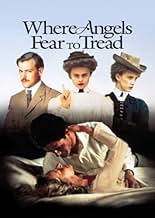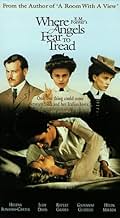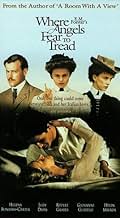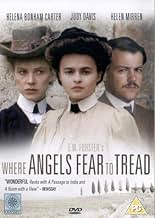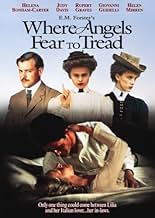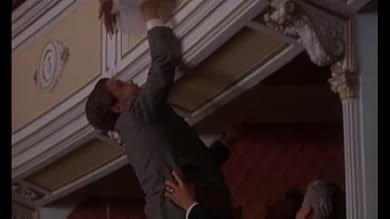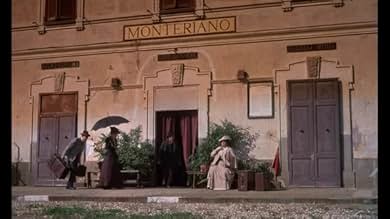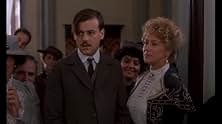IMDb RATING
6.3/10
2.6K
YOUR RATING
After a rich Edwardian widow impulsively marries a handsome but poor Tuscan dentist and dies in childbirth, her English in-laws try to gain custody of the baby.After a rich Edwardian widow impulsively marries a handsome but poor Tuscan dentist and dies in childbirth, her English in-laws try to gain custody of the baby.After a rich Edwardian widow impulsively marries a handsome but poor Tuscan dentist and dies in childbirth, her English in-laws try to gain custody of the baby.
- Awards
- 1 win total
Featured reviews
10Tanechka
Charles Sturridge's adaption of E.M. Forster's classic novel is well in line with such other greats as "Howards End", "A Room With a View", and "A Passage To India". As with all of Forster's work, "Where Angels Fear to Tread" treats the topic of Edwardian British society with poignancy and humour.
Cultures clash when Philip Herriton is forced by his mother to retrieve the only child of his dead sister-in-law, Lilia, from its Italian father. The baby represents both the English and Italian way of life, and the ensuing struggle over it is an analysis of just how futile our own nativist prejudices can be.
Such a sensitive topic is dealt with by a charming cast. Rupert Graves is perfect as a man transformed by his horrific experiences; Helen Mirren is both laughable and lamentable as the tragically flighty Lilia; Helena Bonham-Carter is the soul of goodness, and Judy Davis (a Forster veteran from "A Passage to India") provides comic relief as stuffy Harriet. These fine performances are matched with a beautiful score by Rachel Portman and even more beautiful Italian vistas courtesy of Mr. Sturridge.
Stimulating and provocative, I highly recommend this film to those interested in either Forsters' work or the imperialistic inclinations of the British circa 1900.
Cultures clash when Philip Herriton is forced by his mother to retrieve the only child of his dead sister-in-law, Lilia, from its Italian father. The baby represents both the English and Italian way of life, and the ensuing struggle over it is an analysis of just how futile our own nativist prejudices can be.
Such a sensitive topic is dealt with by a charming cast. Rupert Graves is perfect as a man transformed by his horrific experiences; Helen Mirren is both laughable and lamentable as the tragically flighty Lilia; Helena Bonham-Carter is the soul of goodness, and Judy Davis (a Forster veteran from "A Passage to India") provides comic relief as stuffy Harriet. These fine performances are matched with a beautiful score by Rachel Portman and even more beautiful Italian vistas courtesy of Mr. Sturridge.
Stimulating and provocative, I highly recommend this film to those interested in either Forsters' work or the imperialistic inclinations of the British circa 1900.
I believe I've seen every film adaptation of Forster's work, and I have to say that this is probably the worst of the lot. It has none of the charm of "A Room With a View", and none of the poignancy of "Howards End". Instead, it's a long, slogging story with shrill characters that I could not muster a shred of empathy for. Many of the characters (particularly the elderly Mrs. Harriton and Harriet) are played so far over-the-top that they border on farce. The character of Gino is underdeveloped, which makes the way some characters come to feel about him ring utterly false.
Forster was a homosexual, an Italophile, and scornful of Edwardian British mores and (perceived) hypocrisy. I have no problem with any of those things, but in this, his first novel, it's as if his main intention was to telegraph these things to the audience, and he sets his characters up to that end, but it's never convincing as the natural actions of real humans. If you must watch it, enjoy the Tuscan scenery while you can, but you may want to fast forward through the second-half. For completists only.
Forster was a homosexual, an Italophile, and scornful of Edwardian British mores and (perceived) hypocrisy. I have no problem with any of those things, but in this, his first novel, it's as if his main intention was to telegraph these things to the audience, and he sets his characters up to that end, but it's never convincing as the natural actions of real humans. If you must watch it, enjoy the Tuscan scenery while you can, but you may want to fast forward through the second-half. For completists only.
10clanciai
I was almost more impressed by Charles Storridge's treatment of E,M,Forster than by James Ivory's, since everything is perfect in this film: the acting, the story, the drama, the photography, perhaps most outstanding of all, and the composition of the film building up to an inevitable dramatic climax, turning the enchantingly idyllic scenery into relentless disaster and tragedy. It's acrtually all about a child, while the crook here is a lady, who can't control herself. It's true, the Italian husband also runs out of control sometimes, while Rupert Graves is a consistent paragon of diplomacy. Helena Bonham Carter is the one of them who actually succeeds in understanding the Italians, while all the others are hopelessly at a loss in getting entangled in inexricable complications of the Italian mentality. Helen Mirren is the rich English lady of a mature age who gets hopelessly mixed up with a young Italian man, which triggers the drama, as her family gets more and more upset about it and acts more and more awkwardly to do something about it. It is in fact a shocker, but invaluable for charting cultural clashes between the English and the Italian way, and although you can understand Helen Mirren's initiative and accept her risk, one has to agree with the others whether it actually was so very wise. I haven't read Forster's novel, but it ought to be one of his most interesting ones.
The story is so tragic that this should be a hard-core drama, and parts of it are very poignant, but I also laughed hysterically. This is mainly due to Judy Davis' performance which is so priggish and delightful. Graves and Bonham-Carter played brother and sister in 'A Room With A View' and their chemistry carries over into this film quite well. The music is enchanting. All the way around, a great film.
Where Angels Fear To Tread, a fine novel in its own right, is transferred to the big screen with wit and a painter's eye by the masterful Charles Sturridge. Against a backdrop rich in Edwardian England's own brand of stuffy propriety, we watch cultures and mores clash, with poignant, and occasionally hilarious results. Judy Davis delivers one of my top ten moments on film, a snit of epic self-righteousness, in a memorable scene at the opera. The beauty of the film lies in its fluid and compassionate depiction of the wrongheadedness and confusion which ensue when foreign travelers pack their own narrow values next to the toothpaste, granting themselves permission to brandish them in the face of every long-suffering local along the way. Luckily for us, the film is populated by a believable group of finely drawn characters, played by actors who simply could not be better cast.
Did you know
- TriviaThe movie and source novel's title is derived from stanza in the poem "An Essay on Criticism" (1709) by Alexander Pope. It reads: "Nay, fly to Altars; there they'll talk you dead; For Fools rush in where Angels fear to tread".
- GoofsIn a scene outside on the veranda in Gino's house in Italy, Lilia (Helen Mirren) has her back to the view of the countryside. At one point, when the camera is on her, a white van can be seen driving along the road in the distance. It is clearly a 1990s-era vehicle, moving much faster than automobiles of the era could have.
- Quotes
Mrs. Herriton: [Speaking about Italy] It may be filled with churches and beautiful pictures, but you can only judge a country by its men.
- How long is Where Angels Fear to Tread?Powered by Alexa
Details
- Release date
- Country of origin
- Languages
- Also known as
- Where Angels Fear to Tread
- Filming locations
- Montepulciano, Siena, Tuscany, Italy(on location)
- Production companies
- See more company credits at IMDbPro
Box office
- Gross US & Canada
- $1,403,033
- Opening weekend US & Canada
- $42,404
- Mar 1, 1992
- Gross worldwide
- $1,403,033
- Runtime
- 1h 56m(116 min)
- Color
- Sound mix
- Aspect ratio
- 1.85 : 1
Contribute to this page
Suggest an edit or add missing content


